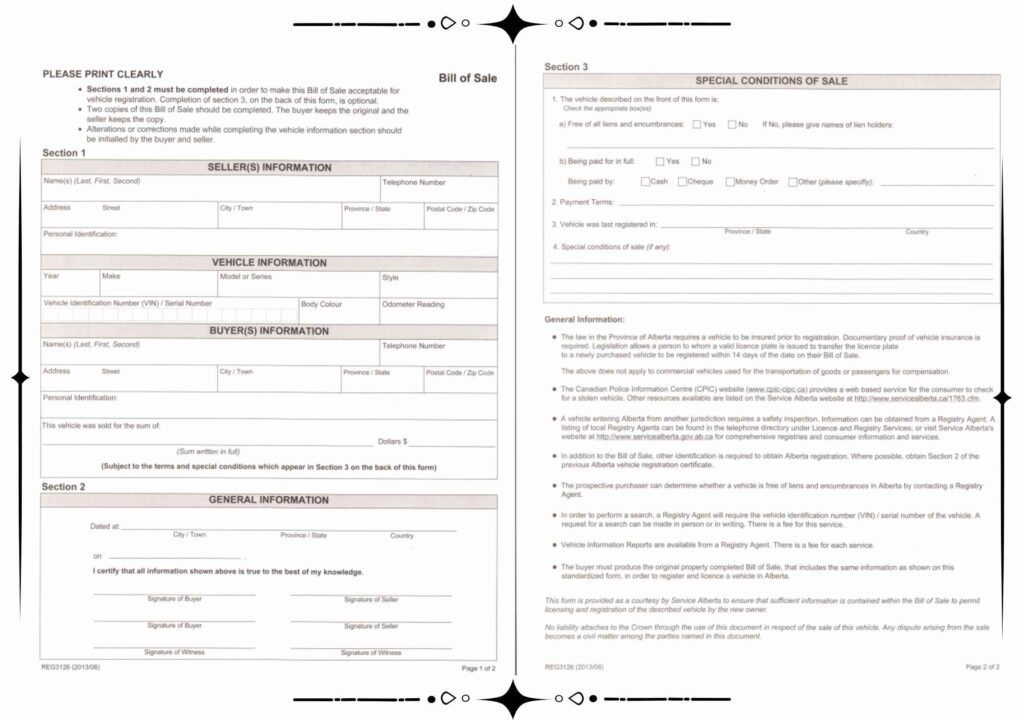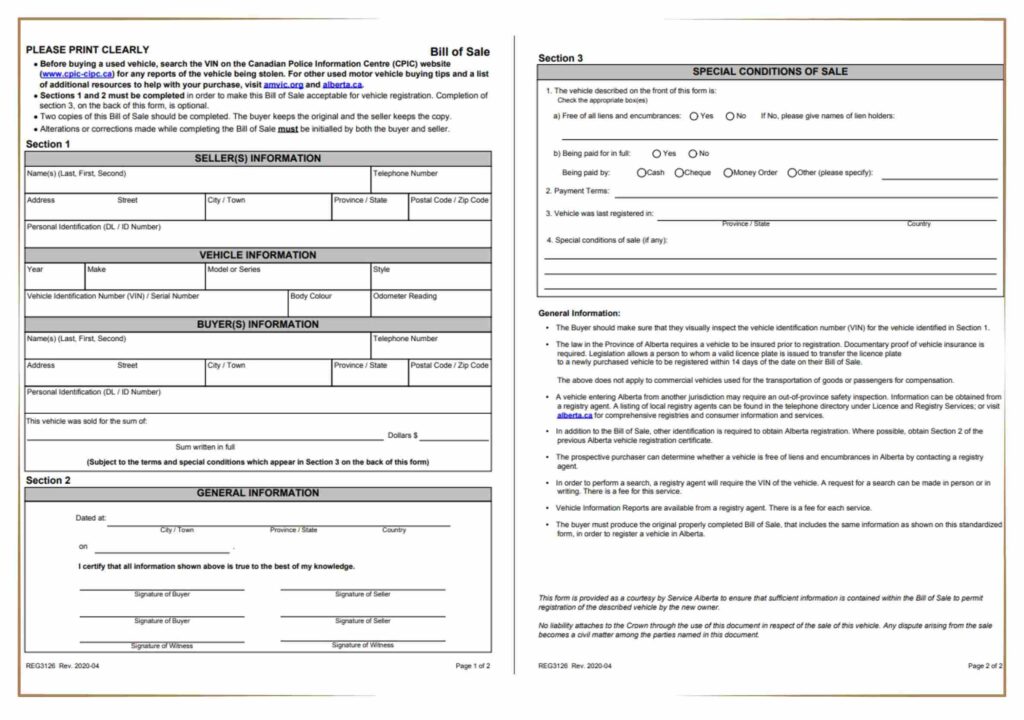The Alberta Car Bill of Sale is a crucial legal document that formalizes the transfer of ownership for a vehicle within the province of Alberta, Canada. This document outlines the terms and conditions of the sale, including important details about the buyer, seller, and the vehicle itself. It serves as concrete evidence of the transaction and is recognized by the Alberta Motor Vehicle Registry (AMVR) as a valid proof of ownership transfer.
Having a valid Alberta Bill of Sale Car is of utmost importance for several reasons. Firstly, it provides legal protection and clarity for both the buyer and seller by documenting the agreed-upon terms and conditions of the sale. Secondly, it ensures compliance with Alberta’s regulations regarding vehicle ownership transfer, as mandated by the AMVR. Without a valid bill of sale, the transfer of ownership may not be recognized, leading to potential legal complications or disputes in the future. Therefore, obtaining and maintaining an accurate and valid Bill of Sale Car Alberta is essential for a smooth and legally recognized vehicle transaction process.
Table of Contents
ToggleFree Car Bill of Sale Alberta
Alberta Bill of Sale Car PDF
Alberta Bill of Sale For Used Car
An Alberta Bill of Sale is an essential document required for the smooth transfer of ownership of a used car within the province. It serves as legal proof of the sale and is a mandatory requirement for registering and licensing the vehicle under the new owner’s name.
Here’s what you need to know about an Alberta Bill of Sale for a used car:
Types of Bills of Sale:
There are two main types of bills of sale used for vehicles in Alberta:
- Standard Bill of Sale: This is the most common type used for private sales between individuals. It captures essential details about the buyer, seller, and the used car itself. You can find a free downloadable template for a standard bill of sale on the Alberta government website.
- Comprehensive Bill of Sale: This is typically provided by dealerships when selling you a used car. It offers a more detailed record of the sale compared to the standard version. It might include information about the vehicle’s condition, any warranties offered, and a breakdown of the purchase price.
Required Information:
A valid Alberta Bill of Sale for a used car typically includes the following information:
- Buyer Information: Full name(s) and address(es) of the buyer(s) (Optional: contact information and ID details).
- Seller Information: Full name(s) and address(es) of the seller(s) (Optional: contact information and ID details).
- Vehicle Description: Make, model (including series/style, if applicable), year, Vehicle Identification Number (VIN), and colour of the used car.
- Sale Details: Date of sale and agreed-upon purchase price of the used car.
- Signatures: Signatures of all buyers and sellers involved in the transaction.
Additional Considerations:
- While not mandatory, including the odometer reading at the time of sale can be helpful.
- Mention the payment method (cash, cheque, etc.) and any specific payment terms if full payment isn’t made upfront.
- Disclose any liens or encumbrances (outstanding debts or claims) on the used car.
- Mention where the vehicle was last registered, as it can be helpful during the transfer process.
- Include any special conditions of the sale agreed upon by both parties.
Benefits of a Bill of Sale:
- Official Record of Sale: Documents the sale details like date, price, and parties involved.
- Legal Protection: Serves as legal proof of ownership transfer in case of future disagreements.
- Proof of Ownership for Buyer: Essential document for registering the used car under the buyer’s name.
- Facilitates Ownership Transfer: Ensures a smooth and streamlined process for transferring ownership.
Obtaining a Bill of Sale:
You can download a free standard bill of sale template from the Alberta government website. Alternatively, some websites offer free templates specifically designed for Alberta. You might also be able to get a blank form from a registry agent.
Remember:
- Ensure all information on the bill of sale is accurate and clearly written.
- Both buyer and seller should keep a signed copy of the completed bill of sale for their records.
By understanding the importance and using a valid Alberta Bill of Sale, you can guarantee a secure and hassle-free transfer of ownership for your used car.
Optional Information for an Alberta Car Bill of Sale
While a standard Alberta Bill of Sale focuses on essential details for ownership transfer, there are several optional pieces of information you can include to create a more comprehensive record of the sale:
Odometer Reading at the Time of Sale:
Including the odometer reading on the bill of sale provides a documented record of the vehicle’s mileage at the time of the sale. This can be helpful for both the buyer and seller in the future:
- Buyer: Provides a reference point for future maintenance needs based on mileage recommendations.
- Seller: Protects against potential claims of tampering with the odometer.
Payment Method:
- Documenting the payment method (cash, cheque, money order, etc.) used for the sale can be helpful in case of any disputes regarding payment.
Payment Terms (if applicable):
- If the buyer isn’t paying the full purchase price upfront, outlining the payment terms (installments, due dates, etc.) on the bill of sale clarifies the payment agreement between both parties.
Liens or Encumbrances on the Vehicle:
- Disclosing any liens (outstanding loans) or encumbrances (claims against the vehicle) on the car is crucial. This transparency protects the buyer from unexpected financial obligations and ensures they are aware of the vehicle’s legal status.
Last Registration Location of the Vehicle:
- Mentioning where the vehicle was last registered can be helpful for the buyer during the registration process at the Alberta Motor Vehicle Registry (AMVR).
Special Sale Conditions or Agreements:
- If there are any specific agreements between the buyer and seller beyond the standard sale (e.g., “as-is” condition, inclusion/exclusion of certain accessories), including them on the bill of sale provides a clear record to avoid future misunderstandings.
Witness Signatures (optional):
- While not mandatory, having witnesses present during the signing of the bill of sale and including their signatures adds an extra layer of verification to the document. This can be helpful in case of any legal disputes regarding the sale.
Remember:
Even though this information is optional, including it strengthens the overall record of the sale and can be beneficial for both the buyer and seller in the future.
Importance of Accurate Completion
An Alberta Bill of Sale is crucial for facilitating a seamless transfer of vehicle ownership between a buyer and seller. However, its effectiveness heavily relies on one pivotal factor: accurate completion. Let’s delve deeper into why maintaining clarity and precision in the document is paramount:
Emphasizing Clarity and Precision in the Document
A well-executed bill of sale eradicates any ambiguity or uncertainty regarding the sale particulars. This entails:
- Clear Identification: It’s imperative to provide precise information about both the buyer(s) and seller(s), encompassing full names, complete addresses, and optionally, contact details and personal identification particulars.
- Detailed Vehicle Description: Accurate documentation of the vehicle’s make, model, year, VIN, and colour is indispensable. This ensures uniformity and clarity in referencing the specific car involved.
- Explicit Sale Details: The inclusion of the sale date and the agreed-upon purchase price is crucial to forestall any potential disputes in the future.
In essence, maintaining clarity and accuracy minimizes misunderstandings, ensuring all parties comprehend the sale terms comprehensively.
Legal Validity and Efficacy of the Bill of Sale
An erroneous bill of sale can undermine its legal validity and effectiveness in several ways:
- Potential Delays: Inaccuracies or omissions may lead to delays during the vehicle registration process at the AMVR, necessitating rectifications or clarifications before processing the transfer.
- Risk of Disputes: Discrepancies in information can pave the way for future legal conflicts between the buyer and seller. For instance, an incorrect odometer reading could spark disagreements regarding the vehicle’s condition.
- Weakened Legal Standing: In the event of legal entanglements, an inaccurate bill of sale might not hold robustly as evidence due to inconsistencies, leaving both parties inadequately protected.
By ensuring meticulous attention to detail throughout the bill of sale, you craft a legally binding document that safeguards the interests of all involved parties. This fosters a seamless ownership transfer process while mitigating the likelihood of potential issues.
The Bottom Line:
Investing effort in guaranteeing the precise completion of your Alberta Bill of Sale yields long-term benefits. A meticulously crafted document not only sidesteps unnecessary complications but also provides assurance, knowing that the sale is well-documented and legally upheld.
Signing and Retaining Copies
Once you’ve accurately completed your Alberta Bill of Sale, the subsequent crucial step is proper signing and record-keeping:
Significance of Signatures from Both Parties
The signatures of both the buyer(s) and seller(s) are imperative for a valid Alberta Bill of Sale. Their signatures signify:
- Agreement to Terms: The signatures denote that both parties agree to the information documented in the bill of sale and the terms of the sale.
- Completion of Ownership Transfer: The seller’s signature acknowledges receipt of the agreed-upon payment and the transfer of ownership to the buyer. The buyer’s signature confirms acceptance of the vehicle and the sale conditions outlined in the bill of sale.
- Legal Weight: The signatures serve as legal evidence of the sale transaction, reinforcing the document’s validity in potential future disputes.
Here are additional considerations regarding signatures:
All Buyers and Sellers: If multiple buyers or sellers are involved, all parties must sign the bill of sale.
Witness Signatures (Optional): While not obligatory, having witnesses present during the signing and obtaining their signatures can provide an extra layer of verification to the document.
Retaining Signed Copies for Record-Keeping Purposes
It’s highly advisable for both the buyer and seller to keep signed copies of the Alberta Bill of Sale for their records. Here’s why:
- Proof of Ownership Transfer: The buyer requires the bill of sale as proof of ownership when registering the vehicle under their name at the AMVR.
- Legal Protection: In case of potential future disagreements concerning the sale (e.g., vehicle condition, payment issues), a signed copy of the bill of sale acts as legal documentation for both parties.
- Record-Keeping: Maintaining a copy enables easy reference to the sale details if needed in the future.
Here are some tips for preserving copies:
Make Copies: Generate photocopies or digital scans of the signed bill of sale for each involved party.
Safekeeping: Store your signed bill of sale copy in a secure location that facilitates easy access when required.
By ensuring both parties sign the bill of sale and retain copies, you establish a transparent transaction record that safeguards the interests of both the buyer and seller.
FAQ
What is an Alberta Car Bill of Sale?
An Alberta Car Bill of Sale is a crucial legal document that serves as proof of ownership transfer for a used car sold privately between a buyer and seller in the province. It is mandatory for finalizing the vehicle registration process and ensures a seamless transition of ownership. Here’s a breakdown of its essential components and significance:
Purpose:
- Records the sale of a used car between a buyer and seller.
- Acts as legal proof of ownership transfer.
- Required for registering and licensing the vehicle under the new owner’s name.
Types of Bills of Sale:
- Standard Bill of Sale: Most commonly used for private sales, capturing vital details about the buyer, seller, and vehicle. (Free download available from the Alberta government website).
- Comprehensive Bill of Sale: Typically provided by dealerships, offering a detailed record including warranty information and purchase price breakdown.
Required Information:
- Buyer Information: Full name(s), address(es), and optionally, contact information and ID details.
- Seller Information: Full name(s), address(es), and optionally, contact information and ID details.
- Vehicle Description: Make, model (including series/style), year, Vehicle Identification Number (VIN), and color.
- Sale Details: Date of sale and agreed-upon purchase price.
- Signatures: Signatures of all involved buyers and sellers.
Optional Information (but recommended):
- Odometer reading at the time of sale.
- Payment method and terms.
- Liens or encumbrances on the vehicle.
- Last registration location of the vehicle.
- Special conditions of the sale.
- Witness signatures (optional).
Benefits:
- Official Record of Sale: Documents sale details for future reference.
- Legal Protection: Provides evidence of ownership transfer in disputes.
- Proof of Ownership for Buyer: Necessary for registering the car under the buyer’s name.
- Facilitates Ownership Transfer: Ensures a smooth process for transferring ownership.
Obtaining a Bill of Sale:
- Free downloadable standard bill of sale template from the Alberta government website.
- Online resources offering Alberta-specific templates.
- Blank form from a registry agent (may not have pre-printed templates).
Remember:
- Ensure accuracy and clarity in all information.
- Both buyer and seller should retain signed copies of the completed bill of sale.
Is an Alberta Car Bill of Sale mandatory for private vehicle sales?
Indeed, an Alberta Car Bill of Sale is a necessary document for private vehicle sales within Alberta. Its significance lies in its multiple roles:
- Proof of Ownership Transfer: The bill of sale is a formal record that certifies the transfer of ownership from the seller to the buyer. This documentation is indispensable for registering the vehicle under the new owner’s name at the Alberta Motor Vehicle Registry (AMVR).
- Legal Record of the Sale: It comprehensively documents the sale particulars, including the purchase price, serving as a crucial reference in case of any future disputes. This legal record can substantiate claims regarding the vehicle’s condition or the agreed-upon sale terms.
- Compliance with AMVR Regulations: A valid bill of sale ensures compliance with the regulations set forth by the Alberta Motor Vehicle Registry (AMVR). By accurately documenting essential information about the vehicle and the involved parties, it minimizes the potential for fraudulent activities and streamlines the ownership transfer process.
To sum up, an Alberta Car Bill of Sale isn’t merely advisable but a mandatory requirement for all private vehicle sales within the province. Without a duly completed bill of sale, the buyer would encounter obstacles in registering the vehicle under their name and legally using it on Alberta’s roads.
Can a handwritten Bill of Sale be used in Alberta?
Yes, a handwritten Bill of Sale can be used in Alberta for private vehicle sales. While it’s more common to find them in digital formats or pre-printed templates, a handwritten document is still considered valid as long as it includes all the necessary information.
Here’s the key takeaway:
- Content Matters More Than Format: The most important aspect is that the bill of sale accurately captures all the essential details about the buyer, seller, and the vehicle being sold. Information clarity and accuracy are crucial for a valid document.
- Standardization Recommended: Although handwritten bills of sale are legal, using a standard format ensures you don’t miss any crucial information. The Alberta government website offers a free downloadable standard bill of sale template (https://www.alberta.ca/standard-bill-sale) which serves as a reliable guide.
Here are some additional points to consider when using a handwritten Bill of Sale:
- Clarity and Readability: Ensure your handwriting is clear and easy to read to avoid any potential confusion during the registration process.
- Signing Both Copies: For better record-keeping, it’s recommended to have both the buyer and seller sign two copies of the handwritten bill of sale – one for each party.
Overall:
While a handwritten bill of sale is acceptable, using a standard template can help guarantee you have all the necessary information documented correctly, avoiding any delays during vehicle registration.

Hi there! I’m Eric Kaplan, and I’m passionate about making your vehicle transactions in Alberta as smooth as possible. With years of experience in the automotive industry, I understand the importance of a clear and concise bill of sale. That’s why I founded billofsalealberta.ca, a website dedicated to providing hassle-free bill of sale solutions for Alberta residents.
At Alberta Motor Association, where I work, I’ve gained invaluable insights into the needs of vehicle owners and buyers. My goal is to simplify the paperwork process, saving you time and ensuring your transactions are legally sound.
Whether you’re buying or selling a car, truck, RV, or any other vehicle, you can count on billofsalealberta.ca to provide you with the necessary documentation tailored to Alberta’s regulations.
I’m here to support you every step of the way, ensuring your vehicle transactions are stress-free and straightforward. Let’s make your next vehicle sale or purchase a breeze with billofsalealberta.ca!

